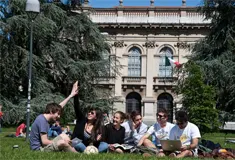
Italy is a popular destination for international students. It offers quality higher education with more affordable tuition fees than other Western European countries. There are around 32,000 international students in Italy, including independent students and those on exchange programmes. With a rich history and tradition of higher education, Italy is always an attractive option for students.
Some of the first universities in Europe were founded in Italy during the Middle Ages and Renaissance. The University of Bologna, founded in 1088, is recognised as the oldest university to still operate. Today, Italy is the home of many prestigious institutions of higher education. Many of Italy’s institutions perform well in the QS World University Rankings, appearing in the top 200 each year.
Italy has played an important role in recent reform of higher education. This reform is known as the “Bologna Process”. The country is one of the four countries that created the European Area of Higher Education. This was formed by signing the Sorbonne Declaration in 1998, which was to be the first step in the higher education reform. Today the Bologna Process is now being implemented throughout Europe.
Italy has around 97 universities, which are divided into several categories:
You will also find 137 other higher education institutions throughout Italy. These are academies that specialise in certain sectors. They range from art, music and dance colleges, to research based and technical institutions.
The Italian higher education system has several levels of higher education. Completing undergraduate studies (bachelor’s degree – ‘laurea’) can lead to master’s studies and earning a master’s degree (‘laurea magistrale’). Bachelor’s studies typically take 3 years to complete and master’s studies take 1 year. Following the completion of your masters studies you can do a PhD which usually lasts 3 academic years.
There are a number of exciting cities for international students to explore in Italy. These include Rome, Milan, Florence, Venice and Turin, among others.
International students will need to obtain a student visa in order to study in Italy. More information about this can be found in our Italy Student Visa Guide.
Italian Language Courses in Sicily Certificate, Summer Course, Winter School
The Italian Academy Italy
Find out moreMaster in Motorcycle Design Master Degree
IAAD. - Institute of Applied Art and Design Italy
Find out moreFashion Direction: Brand & Sustainability Management Master Degree
Milano Fashion Institute Italy
Find out moreCan I study in Italy for free?
Higher education in Italy is not government subsidised, meaning that universities can set their own tuition fees. However, fees are generally affordable for international students looking to study abroad.
Can I study in Italy as an international student?
Italy is a superb place to study as an international student. It has long been a popular destination for studying abroad, and can offer excellent higher education at reasonable prices. If you are from an EU or EFTA country, you will not need a visa to study in Italy. If you are from any other country, you will need to obtain a visa in order to study or stay in Italy. For more information about this and the application process, take a look at our Italian Student Visas article.
Can I study in Italy with English?
Many universities offer their courses in English as well as Italian, meaning you can choose which language you wish to study in. If your first language is not English, you will need to provide evidence of your language proficiency. Most Italian universities accept an IELTS or TOEFL certificate.
| Capital City | Rome |
|---|---|
| Currency | EUR, Euro |
| Language(s) | Italian |
| Universities on StudyLink | 39 universities |
| Major Student Cities | Milan, Florence |
The national language of Italy is Italian, so it is a great chance to learn another language. Having multiple languages is a fantastic skill, and looks great on your CV!
If your course is taught in Italian, you need will need to provide evidence of your language proficiency. If you cannot provide this evidence, or need to improve your skills, many institutions offer language courses.
As well as courses taught in Italian, an increasing amount are being taught in English. You will need to provide evidence that your English skills meet the required standard for your specific course. If you do not meet these standards, most institutions offer courses that will allow you to improve your language skills.
If you choose to study in English, it is still encouraged that you make the most of being in a new country. You should immerse yourself in the culture and traditions. Try your best to pick up the Italian language and interact with the locals to help you improve. This will make your time more enjoyable, and has the potential to make you more employable!

Politecnico di Milano campus, Milan

University of Padua campus, Padua
Sign up to StudyLink.com, the home of quality study abroad advice.
Sign up now
The latest articles from study abroad providers and StudyLink.com to hep you on your study abroad journey.
See more articles